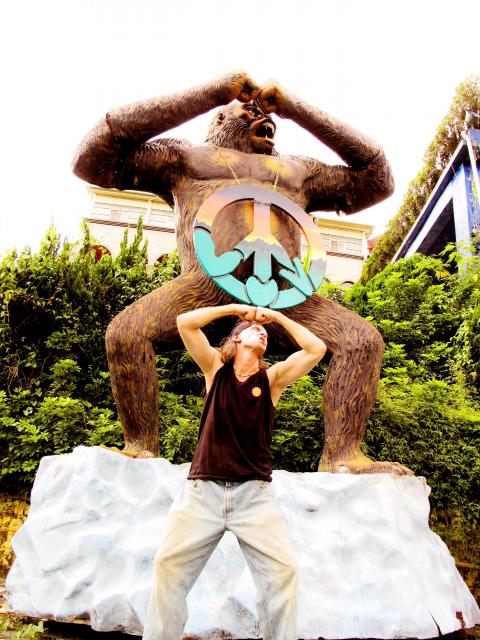If the cynicism of city life is getting too much, if your latent inner hippy is crying for release, or if you just want to get out of town and get down, this weekend promises to dish up a 1960s style loved-up, rocked-out music festival in the form of the seventh annual LUVstock.
Held in an abandoned amusement park outside of Taichung called Dongshan Paradise (東山樂園), the festival’s long list of fairly obscure bands is augmented by a solid lineup of expat regulars, including High Tide, Aurora, Point 22, Dr Reniculous Lipz and the Skallyunz, Native Space, Reider Band, and Three Day Bender. Taiwanese acts include reggae outfit Zion Express (錫安特快) and cover band Dolly Dagger.
Dr Lipz (aka Nick Sylvester) performed an impromptu set at The Refuge Community Gathering Center at Dongshan Paradise a few weeks ago and was won over by its “bizarre and completely original” charm, prompting him to sign up to play LUVstock. “Once the shows are done you’re right in the middle of the mountains,” he said. “Its absolutely beautiful, you’re a minute’s walk away from peace and tranquility, not stuck in a bar.”

photo courtesy of LUVstock
Though the amusement park rides at Dongshan Paradise are no longer in use, there are plenty of activities to entertain festivalgoers, including bands and DJs, wading pools in the nearby river, yoga instruction, and martial art and permaculture workshops, where people can learn various taichi and chigong exercises or find out how to grow their own food.
They say love is free, but at LUVstock a minimum donation of NT$200 is requested to cover the cost of the event. The camping fee is NT$300 per person, and vendors will be on hand selling food and drinks.
The menu includes yogurt, Holland syrup waffles and gourmet pizza from Tin Pan Alley. Vegetarian options will be available and outside food or drinks are not allowed as a percentage of the vendor’s fees goes toward covering costs. An area dubbed the LUVtent will be set up for various charities and fund-raising efforts.
Artists will set up their own tents or exhibit work in a specially designated area. The art on offer will include post-modern works by Brent Nadin of ScallArt, whose large canvases are well worth checking out — especially in an environment where collectors can avoid paying gallery fees. Other artists include Roman McNamara, whose magical realism uses motifs from nature and wildlife to create whimsical and life-affirming pieces.
Organizer Paul Davis, known as Boston Paul to the collective of artists, musicians and bohemians that flock to The Refuge Community Gathering Center he founded, said the event started with drum circles at his house before growing into the 1,000-strong crowd that gathered last year. “People come to the Refuge because they belong to it,” he said. “That’s why this works. We’re not trying to make cash, we just want to pay the bills. It’s a beautiful thing to be a part of.”
Dr Lipz is certainly glad to be a part of it. “You can choose between partying with the bands and DJs or break away on your own and sit by the river,” he said. “It really suits what Paul is doing — there’s nothing else like it.”

June 9 to June 15 A photo of two men riding trendy high-wheel Penny-Farthing bicycles past a Qing Dynasty gate aptly captures the essence of Taipei in 1897 — a newly colonized city on the cusp of great change. The Japanese began making significant modifications to the cityscape in 1899, tearing down Qing-era structures, widening boulevards and installing Western-style infrastructure and buildings. The photographer, Minosuke Imamura, only spent a year in Taiwan as a cartographer for the governor-general’s office, but he left behind a treasure trove of 130 images showing life at the onset of Japanese rule, spanning July 1897 to

In an interview posted online by United Daily News (UDN) on May 26, current Chinese Nationalist Party (KMT) Chairman Eric Chu (朱立倫) was asked about Taichung Mayor Lu Shiow-yen (盧秀燕) replacing him as party chair. Though not yet officially running, by the customs of Taiwan politics, Lu has been signalling she is both running for party chair and to be the party’s 2028 presidential candidate. She told an international media outlet that she was considering a run. She also gave a speech in Keelung on national priorities and foreign affairs. For details, see the May 23 edition of this column,

The Taiwan People’s Party (TPP) on May 18 held a rally in Taichung to mark the anniversary of President William Lai’s (賴清德) inauguration on May 20. The title of the rally could be loosely translated to “May 18 recall fraudulent goods” (518退貨ㄌㄨㄚˋ!). Unlike in English, where the terms are the same, “recall” (退貨) in this context refers to product recalls due to damaged, defective or fraudulent merchandise, not the political recalls (罷免) currently dominating the headlines. I attended the rally to determine if the impression was correct that the TPP under party Chairman Huang Kuo-Chang (黃國昌) had little of a

At Computex 2025, Nvidia CEO Jensen Huang (黃仁勳) urged the government to subsidize AI. “All schools in Taiwan must integrate AI into their curricula,” he declared. A few months earlier, he said, “If I were a student today, I’d immediately start using tools like ChatGPT, Gemini Pro and Grok to learn, write and accelerate my thinking.” Huang sees the AI-bullet train leaving the station. And as one of its drivers, he’s worried about youth not getting on board — bad for their careers, and bad for his workforce. As a semiconductor supply-chain powerhouse and AI hub wannabe, Taiwan is seeing